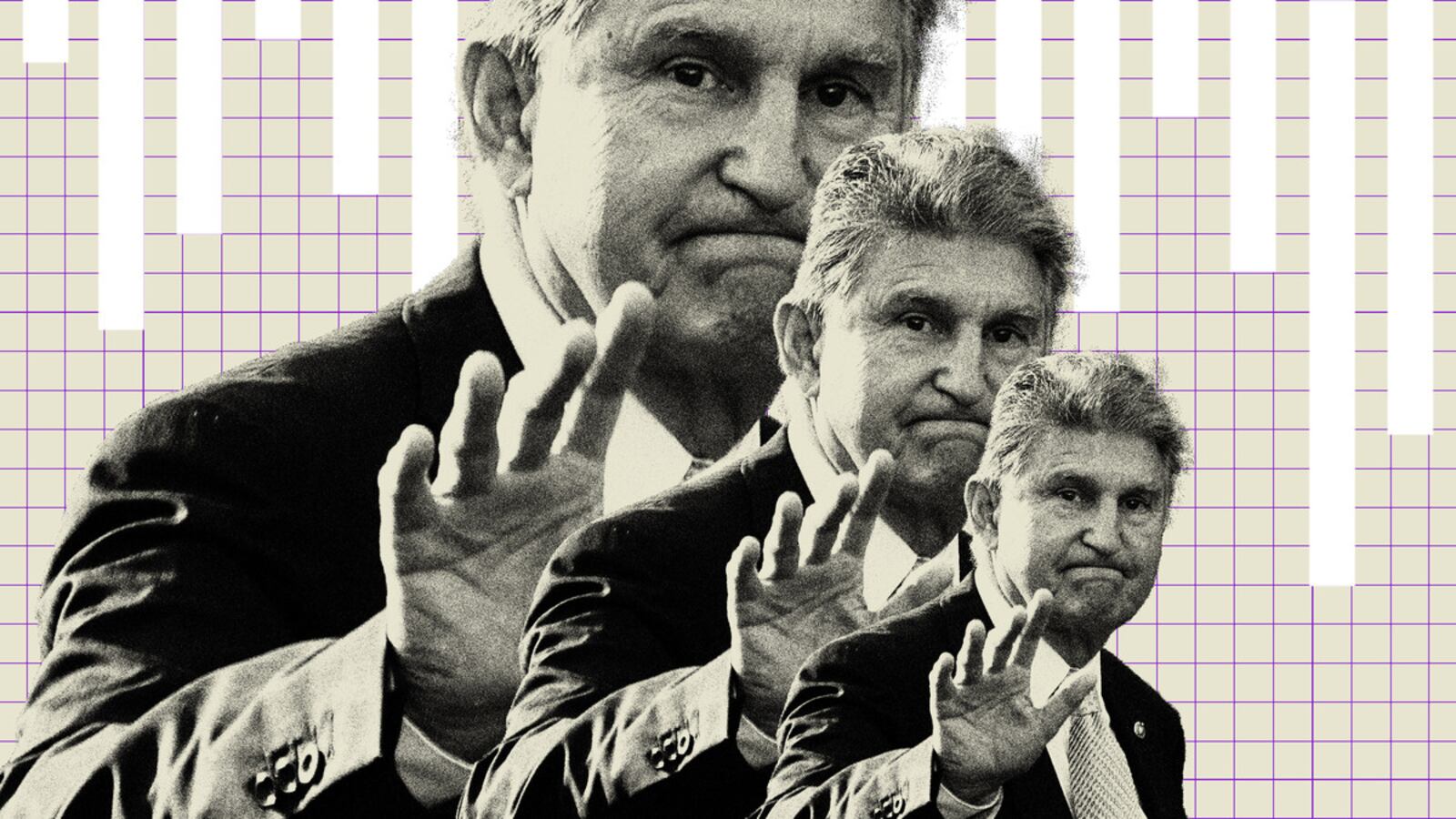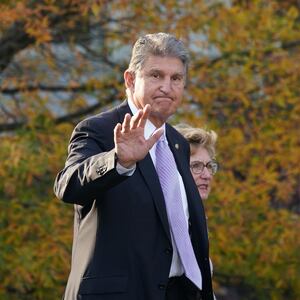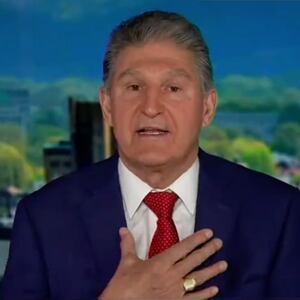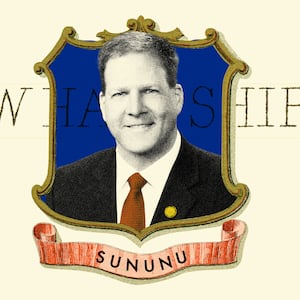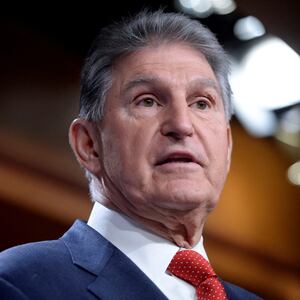MANCHESTER, New Hampshire—At their town hall event on Monday night to begin what could be a historically well-funded third-party presidential effort, the centrist group No Labels seemed to have all the right ingredients in place.
They had two bold-faced headliners: Sen. Joe Manchin (D-WV) and former Utah Gov. Jon Huntsman (R), who floated supporting a third-party candidacy, or in Manchin’s case running himself.
In the crowd at St. Anselm College, No Labels had a high-wattage roster of guests, ranging from former North Carolina Gov. Pat McCrory (R), former Rep. Fred Upton (R-MI), former Rep. Joe Cunningham (D-SC), and even the popular Republican home state governor, Chris Sununu.
They had on hand several hundred curious voters—clutching No Labels’ glossy pamphlets and sleek No Labels swag—who heard lots of talk about “fixing, not fighting” the nation’s problems with a focus on substance and solutions instead of partisan rhetoric.
For all the pomp and performance, however, what No Labels and their allies clearly lacked was much in the way of substance and solutions—or a plan to do much more than potentially play spoiler in the 2024 contest.
While Manchin was the main draw, the night was dedicated to the rollout of “Common Sense,” a platform-style document that serves as No Labels’ justification for a third-party presidential campaign. The effort has yet to become official, but is being prepared and reportedly funded in the event of a repeat of the 2020 election.
Cloaked in the conspicuous symbolism of the Founding Fathers, the group describes Common Sense as a “policy booklet that serves as a blueprint for where America’s commonsense majority wants this country to go,” based on over a year of “listening to and surveying tens of thousands of Americans to understand their aspirations and priorities for the country.”
For all the talk from Manchin and Huntsman on today’s politics being all about style over substance, the perfect-bound and smartly branded packet seemed to define the former.
Across 63 glossy pages, the two most concrete policy solutions were to establish national commissions—a time-honored Beltway tradition in the event lawmakers don’t have an actual solution—to address the national debt and the rise of artificial intelligence.
The town hall event itself didn’t offer much more. On the subject of climate change, Manchin did not take any further questions beyond a pre-approved one from an attendee during the Q&A portion of the event.
At another point, McCrory tried to explain why he thinks No Labels won’t alienate centrist voters who want the government to do something to curtail emissions and reduce carbon, but got interrupted by an angry voter during his interview with The Daily Beast.
“The all of the above will do something about climate change,” McCrory said before being interrupted by the climate-concerned voter, who did not offer his name. “This is a draft here, man. We’re trying.”
Indeed, in the pamphlet’s “Idea 15,” the notion of a consensus on climate is floated in place of an actual policy—save for support of the aforementioned “all of the above” energy approach, which is more talking point than position.
“Most Americans want clean air and water, are concerned about climate change, and support the idea of Washington making significant investments to spur the adoption of cleaner energy resources,” reads the blurb written by No Labels chief strategist Ryan Clancy.
In fact, the climate change proposal claims “most Americans do not support government restricting access to fossil fuel energy at a moment when we don’t yet have enough” renewables to replace it, before offering “the expansion of carbon-free nuclear power” as the lone solution proposed.
At other points of the evening, No Labels’ big-name guests seemed most interested in less high-minded draws of the event. Sununu, for instance, mopped up reporters’ attention and took plenty of questions. But he wasn’t in much of a mood to talk about another rare concrete proposal in the Common Sense pamphlet: raising the federal age to buy a firearm to 21 years old.
“Sorry, I just haven’t read it,” Sununu told The Daily Beast on his way out from a gaggle with reporters.
No Labels’ pitch for 2024 is simple. American voters, they argue, aren’t happy with the prospect of another four years of President Joe Biden, nor do they want Donald Trump to return to the White House.
Some public opinion polls support the general notion. But for now, No Labels is offering little in the way of an alternative, lacking not only a real vision but a candidate who would take it up.
Many Democrats believe No Labels—with a reported budget in the tens of millions of dollars—would ultimately be an expensive and quixotic spoiler that hands the election to Trump.
Those suspicions have grown with the group’s steadfast refusal to provide information about its donors; some of its known donors are wealthy Republicans, like Harlan Crow, the Texas billionaire who courted Justice Clarence Thomas.
In New Hampshire on Monday night, some top No Labels officials seemed to be at a loss when explaining how their third-party effort might play out.
When pressed on how a third-party run wouldn’t benefit Trump the most in a hypothetical rematch, former Sen. Joe Lieberman—the famed centrist and No Labels chair—tried to argue polling shows it would have no tangible benefit to Trump. Recent surveys featuring a No Labels candidate, however, show Trump gaining between 1 and 3 percentage points in the scenario.
Once Lieberman abandoned the polling argument, he conceded he would vote for Biden if it were a one-on-one rematch with Trump.
“We’re gonna have a tough decision to make next year if it is Trump and Biden and there’s no real change in the parties,” Lieberman said, adding that No Labels would need a strong ticket to avoid being a spoiler. He also emphasized he was speaking in his personal capacity, not for No Labels.
Notably, the group has said their plans to offer a candidate hinge on whether a Trump-Biden rematch remains likely by Super Tuesday in March 2024.
Beyond promises of a committee being formed to select a nominee and a vice presidential pick, there are few specifics on who the ticket would be or how they would be chosen. Organizers are planning to hold a No Labels convention in Dallas next April, conveniently shortly after Super Tuesday.
On Monday, Manchin remained coy, saying he would wait until next year to make a decision, while McCrory told The Daily Beast that No Labels is still in the very early stages of forming the nominating committee.
Despite the lingering questions, compared to where No Labels was eight years ago, its return to New Hampshire was a production to behold.
The last time the group held an event like this in New Hampshire in 2015, a far less ritzy production at the Radisson Hotel across the river in Manchester was forebodingly hijacked by Trump, who cramped the vibe of bipartisanship and decorum.
This time around, No Labels wants the immediate message to be clear: They’re serious, they have money, and they have a nationwide operation up and running. McCrory said the group plans on securing a spot on the ballot in all 50 states.
After the town hall, some attendees didn’t seem sold on the idea.
“There are a couple things I gasped at,” T.D. Floras, an independent Nashua voter and retired retail manager, told The Daily Beast. She said she was particularly aghast at how dismissive Manchin and Huntsman were to what impact a third-party run might have on Trump’s chances of returning to office. She also took issue with the No Labels organizers requiring attendees to submit questions in advance.
“That’s not how we do it in New Hampshire,” she scoffed, adding she left the night far less likely to back a No Labels bid, especially if Manchin were the candidate.
Still, No Labels seemed to find at least a few sympathetic ears in the audience.
Charles Jessie, a New Hampshire Republican who said he identifies as being among “the ambivalent right”—a fancy way of saying fiscally conservative but socially liberal—said he was mainly drawn to the event for Manchin and didn’t know Huntsman was co-headlining it as the Republican.
Jessie said he would treat the prospect of a second Trump or Biden term about the same, and was strongly interested in backing a third-party candidate.
“What’s in my face today is Biden,” Jessie said. “I still remember Trump being in my face too. They both bother me.”
When asked who he’d like to see as a third-party candidate, he could only name Manchin.

